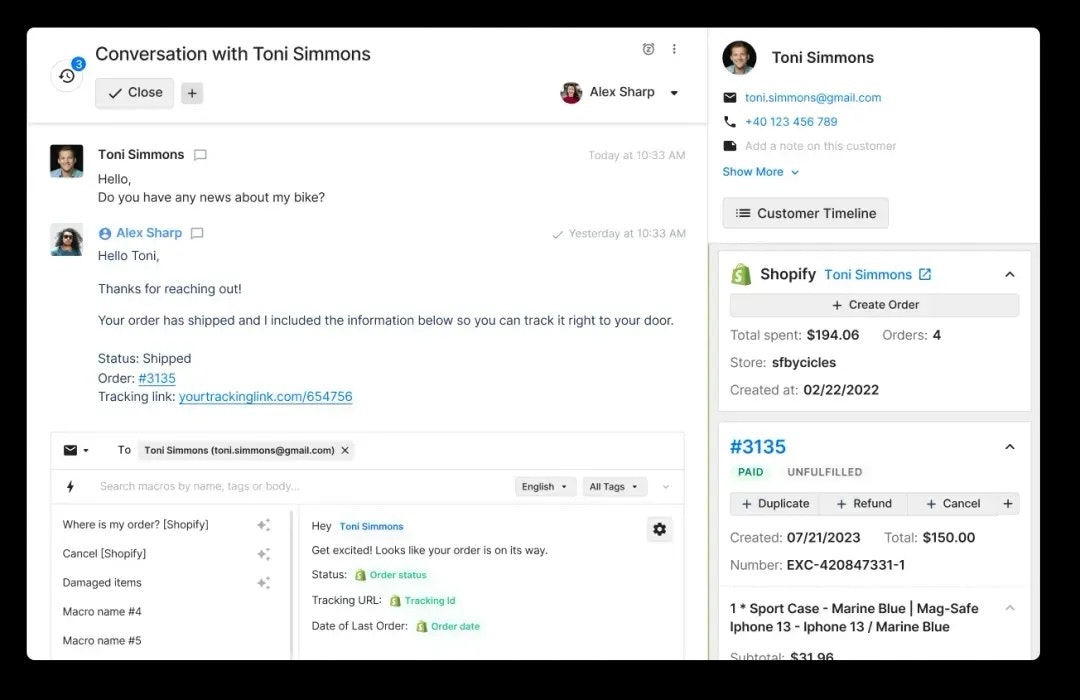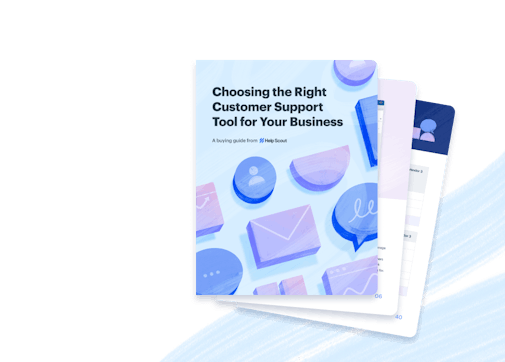It’s common knowledge that people value quality customer service. Still, it may be surprising to learn that a bad experience may be enough to cause a customer to churn.
A 2021 survey of more than 1,000 customers found that “65% of customers … said they have switched to a different brand because of a poor experience.” Given that the possibility of churn is so high, companies must equip their teams with the right skills to facilitate a good experience and the tools to deliver one.
While the help desk market is vast, not all software solutions are created equal. Each has pros and cons that might make it a perfect fit for one organization and a nightmare for another. In this article, we’ll look at the support platform Kustomer and some alternatives for those who aren’t sure if Kustomer is the best fit.
What is Kustomer?
Marketing itself as “the smart and simple customer service platform, powered by data and AI,” Kustomer is a customer communications platform designed for seamless omnichannel customer support across email, chat, social media, voice, SMS, and self-service. The company has been on the scene since 2015 but has recently seen some big changes, including a 2022 acquisition by Facebook’s parent company, Meta, and then a subsequent spinoff from the company in 2023.
While most help desks revolve around tickets, Kustomer centers its support method around a “customer timeline.” Unlike tickets that silo issues into individual conversations, a customer timeline shows all of a customer’s interactions in a continuous flow, regardless of channel. This places the customer journey front and center, helping agents provide highly personalized support. In addition, a timeline allows customers to easily switch between communication channels without starting over from scratch — an essential feature for those who are always on the go.
Kustomer offers features one would expect to see in a support platform — a knowledge base builder, internal collaboration tools, and workflows to automate tasks — but it also offers more advanced features like KustomerIQ, its artificial intelligence offering. KustomerIQ aims to both improve the support provided to customers through features like intent, sentiment, and automatic language detection, as well as deflect contacts through the use of chatbots that can provide instant answers even when agents are offline.
What do customers say about the Kustomer platform?
Reviews of the platform on G2 and Capterra are relatively positive, with users praising the customer timeline, reporting, and integration abilities. On the flip side, reviewers also note issues with frequent outages and a higher price tag than much of their competition. There was also some confusion during the Meta acquisition about whether the platform was going to continue to offer HIPAA compliance to its customers. While the company’s security policy says that signing a Business Associate Agreement (BAA) is still an option, there isn’t any information about the offering on its pricing page.
The 9 best Kustomer alternatives for help desk tickets
Kustomer is a great support platform; however, depending on your budget and specific needs, there might be a better choice. If you’re unsure if Kustomer is right for you, here are nine alternatives that might fit the bill.
1. Help Scout
Best Kustomer alternative for growing teams that require HIPAA compliance.
Help Scout is a communication platform that helps teams across an organization have better conversations with their customers and clients. Providing access through email, live chat, social media, and self-service channels, Help Scout makes it easy for your community to connect with you however they feel most comfortable.
Incoming conversations flow into a shared inbox that looks and feels similar to a regular email client. However, Help Scout’s inbox is much more powerful than standard email, providing collaboration tools like conversation assignments, private notes, and collision detection as well as reporting dashboards that help you measure your success.
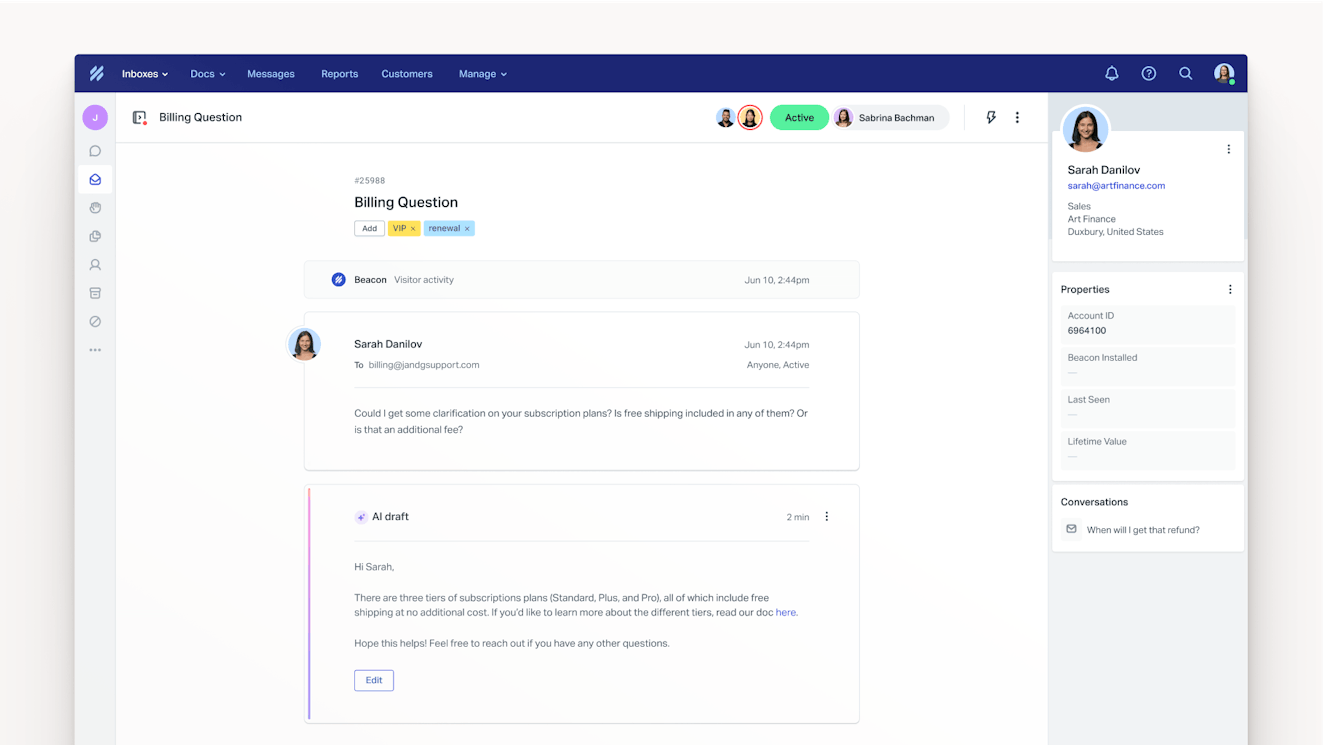
In addition, Help Scout’s inbox can increase your team’s productivity through the use of saved replies, workflows that use tags and other conditions to automate busywork, and AI features that save time and free up your employees for more important tasks.
Help Scout’s web widget, Beacon, is also a great tool for customer engagement. It allows teams to offer proactive, targeted support when customers need it the most. The tool can surface relevant support Docs, launch a live chat to assist during a tricky part of the customer journey, keep track of customer activity on your site, and even help your team gather customer feedback in the moment when their thoughts are fresh.
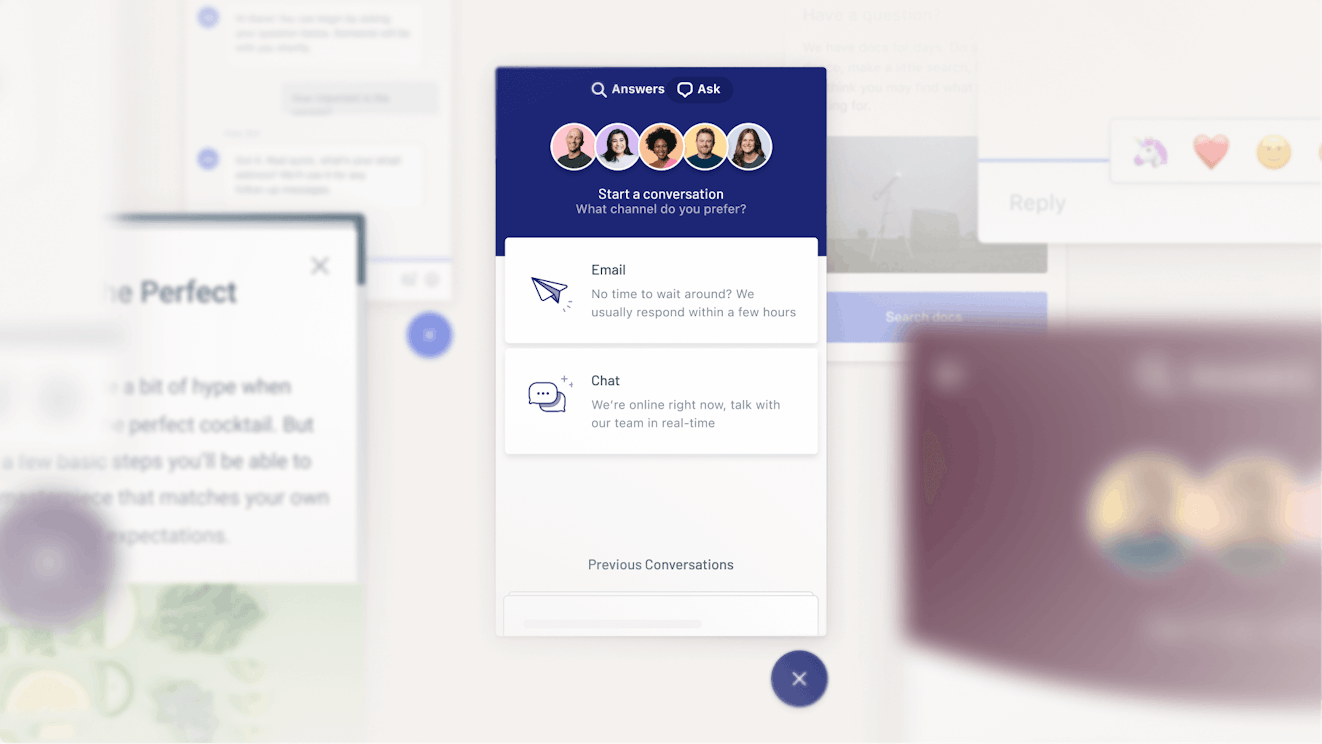
For those who need to connect their support platform with other tools, Help Scout offers many integrations for popular tools such as Jira, Salesforce, HubSpot, and Shopify.
Lastly, Help Scout maintains ongoing compliance with HIPAA and can process, maintain, and store protected health information (PHI). You can learn more about Help Scout’s HIPAA offering here. Though you can also configure a couple of other solutions on this list to comply with HIPAA, Help Scout is one of the more affordable options.
While an excellent choice for organizations in any industry, Help Scout’s ability to handle PHI makes it a good pick for medical offices, independent health practitioners, and other organizations that may not have access to this type of data security on other platforms.
Price: Free plan available. Paid plans start at $50 per month. HIPAA compliance is available as an add-on to the Plus plan or as part of the Pro plan. Visit our pricing page for more details.
2. DelightChat
Best Kustomer alternative for ecommerce brands that use WhatsApp.
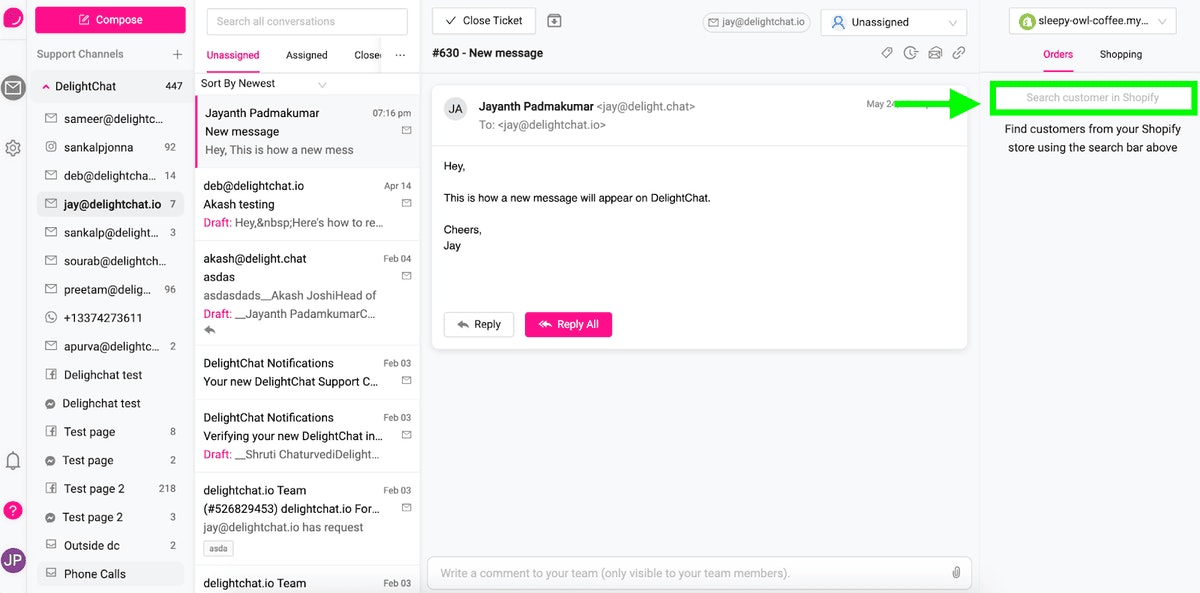
DelightChat is a support and marketing platform aimed at ecommerce companies. While it supports the use of email, live chat, Facebook and Instagram messaging, and a self-service help center, access to the WhatsApp API is a big reason to choose DelightChat over other options.
Beyond managing support, teams can use WhatsApp as a marketing channel by sending abandoned cart, order confirmation, tracking, and personalized messages to customers through the app.
DelightChat is also a good choice for ecommerce due to its deep Shopify integration. Agents can view, edit, refund, or cancel orders without leaving the DelightChat dashboard. Having the information close at hand makes providing a quality support experience even easier.
Price: Free trial available. Plans start at $49/month plus WhatsApp charges.
3. Front
Best Kustomer alternative for teams that focus on email support.

Front is a support platform offering email, SMS, social media, and WhatsApp management through a central shared inbox. Though Front does a great job with all its offered channels, email is where the product shines.
Front is different from most help desks in that teams can handle all their email communications (personal or those sent to a team account) from within one tool. The platform also supports calendar integration, making it easy to schedule meetings with a single click.
Front is also a good tool for collaboration. It offers the ability to assign tickets to specific team members, work on drafts with other agents, and leave private notes within conversations. The tool can also be used to create automated workflows to streamline tasks, offers AI features to help with certain tasks, and reporting dashboards to help keep your team on track.
For those requiring voice, SMS, or WhatsApp, Front doesn’t offer native solutions, so you’ll need to look into integrations to support those channels. In addition, potential customers should be aware of the limitations of the platform’s Starter plan. Though $19 per person sounds good, the base plan does not offer key features like reporting, customer satisfaction (CSAT) surveys, or AI tools.
Price: Free trial available. Plans start at $19/person per month.
4. Gorgias
Best Kustomer alternative for ecommerce companies.
One of the best choices for small to mid-size online retailers, Gorgias is a help desk dedicated to ecommerce support. The platform centralizes your email, social media, SMS, voice, and chat support into one tool and provides all the features needed to “monetize your customer care.”
Gorgias’ most significant selling point is its Shopify integration. Like DelightChat and Help Scout, Gorgias makes it easy for your team to perform actions like refunds or order modifications from within the ticket window. If your company doesn’t use Shopify, Gorgias also integrates with other popular platforms like Magento and BigCommerce, making it a good choice for retail customers.
Beyond its integrations, Gorgias has many of the same features other solutions offer — ticket assignments, shared macros, collaborative tools, reporting, and a knowledge base builder. The software also comes with standard rule-based automations as well as artificial intelligence offerings like sentiment and intent detection and the ability for a virtual agent to provide instant answers to basic questions when your team isn’t available.
One thing to keep in mind with Gorgias is their approach to pricing. Each plan comes with monthly ticket limitations, AI features are only available as a plan add-on, and those who choose to go with the Starter plan will find that it is missing key features like user permissions.
Price: Free trial available. Plans start at $10/month.
5. Zendesk
Best Kustomer alternative for enterprise companies that want to incorporate AI.

Kustomer’s most significant competition in the enterprise space is Zendesk. Zendesk offers every channel that Kustomer does and the platform’s name recognition alone makes it hard for companies like Kustomer to compete.
For large organizations looking to take advantage of AI, Zendesk is a good pick. The platform has sentiment and intent detection that shows agents essential information and offers handling suggestions that can help resolve tickets faster. The system uses the same technology to create more intelligent routing automations, and Zendesk even offers virtual agents that can handle basic requests on their own.
Like Help Scout, Zendesk offers HIPAA compliance as part of its Suite Professional and Enterprise plans. Although Kustomer’s Enterprise plan is cheaper per agent, its HIPAA costs aren’t readily available on its pricing page. This makes it more difficult for medical and health organizations to evaluate their choices at a glance.
As a last note on cost, Kustomer’s Enterprise plan is the cheapest plan it offers, and it has a minimum requirement of eight seats. Zendesk provides a range of plans for businesses of all sizes with no agent minimums. This might make Zendesk a more attractive option for some teams.
Price: Free trial available. Plans start at $19/agent per month. AI features are available as a $50/agent per month add-on.
6. Freshdesk
Best Kustomer alternative for enterprise teams seeking more competitive pricing.

While on the topic of competitive pricing, let’s look at Freshdesk, another omnichannel offering similar to Zendesk. It offers all the same channels you’ll find on Zendesk or Kustomer, like email, voice, social media, messaging, and self-service, all brought together into one team inbox.
For those interested in AI, Freshdesk offers a branded tool called Freddy. The assistant can help streamline processes through smart automations and offer handling suggestions to agents. In addition, its use of natural language processing (NLP) and generative AI can help detect language, intent, and sentiment and even offer direct customer assistance.
Price-wise, Freshdesk is more accessible than Kustomer. Freshdesk offers a freemium option for those who need minimal features and only require email and social channels. They also provide several other tiered options with the ability to add on features like Freddy or a field service tool. Even at its most expensive tier, Freshdesk is $10 less per agent than Kustomer’s entry-level plan, and it doesn’t require any agent minimums.
For teams that want an enterprise platform with a less expensive entry point, Freshdesk is a good option.
Price: Free trial and plan available. Paid plans start at $15/agent per month.
7. Zoho Desk
Best Kustomer alternative for teams using Zoho CRM.
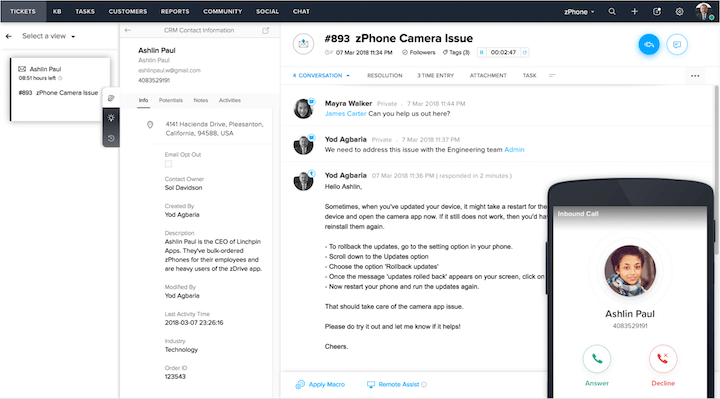
Zoho Desk is a solid alternative to the Kustomer platform, offering many of the ticketing system features needed to provide great support to your customers. It handles email, voice, social media, and live chat channels. You can assign tickets, create workflow automations, build a customer help center, and review trends via reporting dashboards.
Zoho has an AI offering, Zia, which can detect user sentiment, automatically tag tickets, suggest relevant articles to agents to use in ticket responses, and alert your team to unusual activity in your queue.
While all these tools are helpful, the main thing that sets Zoho Desk apart from other platforms is its seamless integration with Zoho products. In particular, connecting Zoho Desk with their CRM can make your help desk more powerful, providing agents with customer information inside of their ticket that lends to a more personalized support experience for the customer.
Price: Free trial and plan available. Plans start at $7/user per month.
8. HappyFox
Best Kustomer alternative for IT teams.
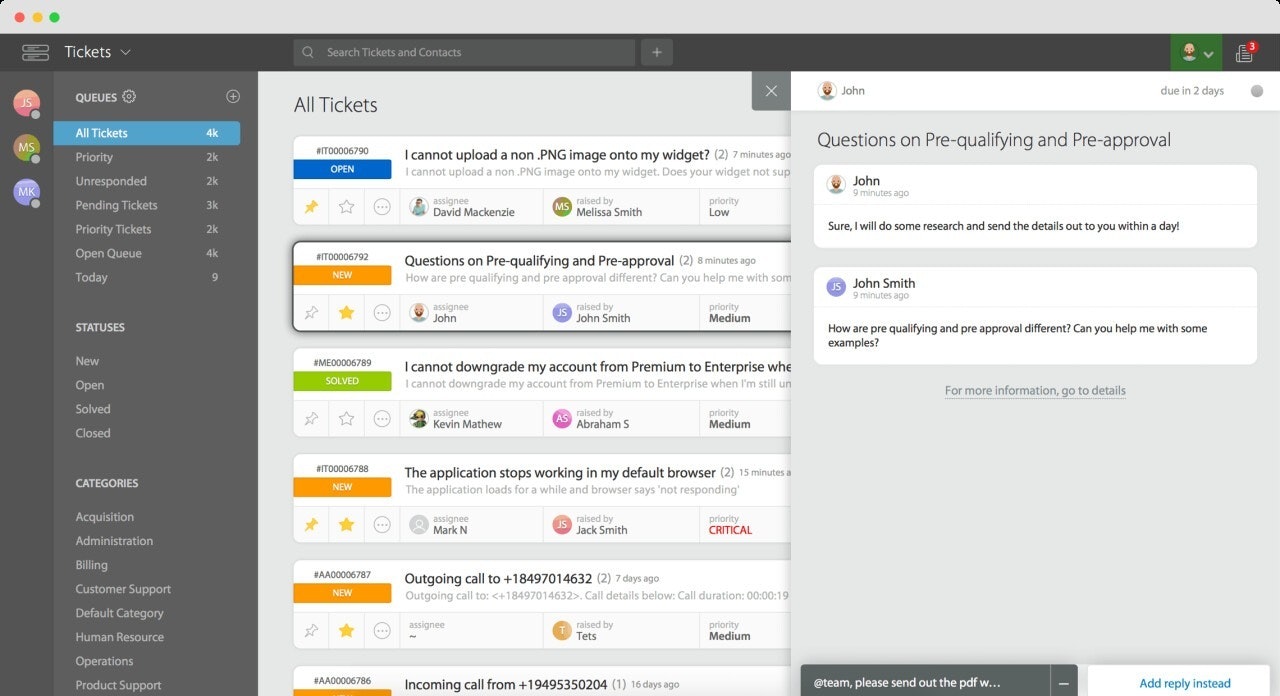
HappyFox is help desk software that offers out-of-the-box support for email ticketing and the ability to create internal and external knowledge bases. Additional channels — such as social media, voice, and chat — can also be handled through platform integrations.
Some of the integrations mentioned above are also HappyFox products, such as HappyFox Chat and HappyFox Chatbot. There is also a separate product, HappyFox AI, that can provide your team with features powered by generative AI. Though you can seamlessly connect these products with their help desk, they are not included in any plans, meaning you will need to sign up for additional subscriptions to use them.
Once you’ve decided on channels, HappyFox provides all of the features you’ll need to provide excellent support for your community — a shared inbox, ticket assignments, collision detection, ticket templates, canned responses, automated workflows, reporting dashboards, and more.
There are some unique features in HappyFox’s ticketing software that you won’t find in other options on this list. First, it allows switching to a kanban ticket view. This is helpful for those who prefer a more visual representation of their workload. Secondly, the platform offers an asset management feature to help IT departments efficiently manage tech assets like laptops and cell phones from within the help desk.
Price: Free trial available. Plans start at $26/agent per month.
9. Kayako
Best Kustomer alternative for companies that prefer an on-premises option.
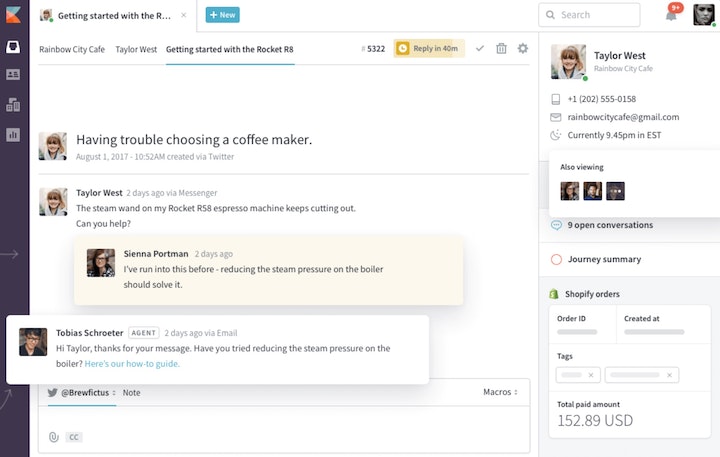
Like Kustomer, Kayako is a support platform that builds its user interface around a customer timeline. Dubbed “SingleView,” Kayako’s timeline provides a detailed view of the entire customer journey in one place. See what pages the customer has visited, which products they’ve viewed, and if they’ve encountered any rough spots in the process. The approach gives agents all of the information they need to provide tailored assistance to customers, and when you add integrations like Salesforce, it can be quite powerful.
Channel-wise, Kayako supports email, live chat, self-service via a native knowledge base builder, and an integration with Facebook. Agents can use canned responses, create automated workflows, leave internal notes on tickets, and view custom performance reports. Your team can also add collaborators — employees who aren’t customer-facing but who may be able to provide help and context to a case — to improve service and resolution speed.
An interesting feature of Kayako that might appeal to some customers is the option to host your instance of Kayako locally vs. using the company’s cloud-based option. While a more complicated solution technically, it can be helpful for teams that require more control over their data.
Price: Contact for pricing.
Should you stick with Kustomer?
The Kustomer support platform offers excellent features, and most users are satisfied with their service. However, for those concerned with the mention of service interruptions, it might be worth checking out other options.
The nine options above provide the ability to deliver delightful customer experiences, but each comes with its own twist on service that sets it apart. Services like Help Scout or Zendesk can be customized to meet HIPAA requirements, ecommerce companies may be drawn to DelightChat, Help Scout, and Gorgias’ Shopify integrations, and those who like to view personal and team email within one tool may prefer Front.
Beyond looking at what sets each platform apart, we suggest utilizing the free trial offerings for all the tools that spark interest. We’re confident that once you see them in action, it’ll be easy to determine the best fit for you.
Interested in switching to Help Scout? Our data migration capabilities make it easy to transfer your data and conversation history from Kustomer to Help Scout without any help from your IT department. You can learn more about the process here.




